|
Events convened on Friday,
17 December 2004
|
|
National Adaptation Programmes of
Action: Preparation and implementation
strategies
Presented by the Government of Bhutan
|
|
|
|
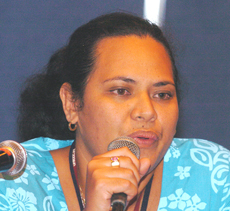 |
|
Violet Wulf Saena, Samoa’s
Ministry of Natural Resources and
Environment, said project-based criteria
to prioritize adaptation projects
include awareness and institutional
arrangements, while community-based
criteria include livelihood, well-being
and equity |
|
La’avasa Malua, Samoa’s Ministry of
Natural Resources and Environment,
said the side event aims to, inter
alia, provide information on issues
faced by five least developed
countries in preparing their
National Adaptation Programmes of
Action (NAPAs).
El Hadrami Bahneine, Mauritania’s
Director of the Environment,
stressed that Mauritania was the
first country to submit its NAPA,
based on guidelines developed by the
Conference of the Parties as adapted
to national specificities. He
stressed that civil society was
involved in all stages of the
preparation process, noted that the
choice of experts and timeframes are
crucial, stressed difficulties in
selecting criteria for prioritizing
adaptation needs, and said the
process allowed Mauritania to
complete information regarding
vulnerability on a sectoral basis.
Jigme, Bhutan’s National Environment
Commission, highlighted the
multisectoral and participatory NAPA
preparation process in his country,
based on thematic assessments of
vulnerabilities. He said climate
change is integrated into other
national policies and plans, and
outlined adaptation measures,
including early warning systems and
disaster management.
|
|
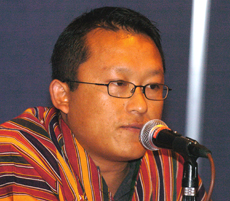 |
|
Jigme, Bhutan’s National
Envrionment Commission, said assessment
of vulnerability for the elaboration of
teh NAPA is being undertaken on a
sectoral basis |
|
He
said challenges include addressing
limited awareness, a lack of
technical capacity, and paucity of
information and data. He stressed
that delaying NAPAs’ adoption would
have serious consequences due to the
current weak capacity for
adaptation.
R.P Kabwaza, Malawi’s Ministry of
Mines, Natural Resources and
Environmental Affairs, said the
objectives of Malawi’s NAPA are to
identify priority activities and
projects, formulate adaptation
strategies, build capacity, and
raise awareness. He stressed limited
input from foreign experts,
monitoring and evaluation by a
steering committee, a
multistakeholder participatory
process, links with the First
National Communication and other
sectoral policies, and the need to
address poverty alleviation. He
noted that difficulties include a
lack of information and problems in
recruiting skilled experts for a
short period of time.
Describing Mozambique’s NAPAs'
preparation, Marilia Telam Manjate,
Ministry for Coordination of
Environmental Affairs of Mozambique,
highlighted the participatory and
region-based assessment process, and
said possible
adaptation measures
include improvement
of early warning
systems. She said
NAPA’s benefits
include increased
access to drinking
water and the
creation of new
income sources.
|
|
Violet Wulf Saena,
Samoa’s Ministry of
Natural Resources
and Environment,
said her Ministry
was responsible for
developing the NAPA,
noting
multistakeholder
preparatory teams.
She said a
country-wide
consultation was
carried out to
identify gaps and
prioritize action,
noting country- and
community-based
criteria for
prioritization. She
noted that
developing NAPAs is
a time-consuming and
learning process,
and stressed funding
issues and the need
to integrate NAPAs
with development
plans, community
commitments and
monitoring.
Discussion:
Participants
stressed the need
for, inter alia, a
country-driven
process and
integration with
other policies. They
also noted
complications in
defining criteria to
prioritize urgent
needs.
|
|
|
The PIN program at the International
Institute for Applied Systems Analysis:
Facilitation of the climate talks
Presented by the Government of Austria
|
|
|
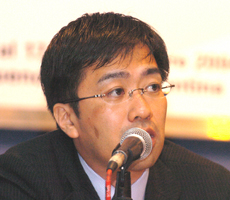 |
|
Norichika Kanie, Tokyo Institute
of Technology, said only Canada,
Denmark, Switzerland and Indonesia have
NGO representatives on their delegations
who are not former government officials |
|
Gunnar Sjöstedt,
Swedish Institute of
International
Affairs, stressed
the value of social
scientific expertise
in facilitating
political
negotiations by
offering ideas for
restructuring the
international policy
process. He stressed
the need to develop
long-term strategies
for structuring the
negotiation process,
and recommended
using professional
facilitators in
future meetings,
launching
capacity-building
programmes for
delegates and NGOs
in negotiation
techniques, and
using regional fora
to promote political
coordination and
exchange of views.
Norichika Kanie,
Tokyo Institute of
Technology,
advocated further
strengthening
vertical linkages
between multilateral
environmental
agreements and
domestic
constituencies.
Noting that while
the number of NGO
participants in
climate meetings
rivals that of
government
delegates, he said
the decision-making
process has not
become more
democratic or
transparent. He
proposed
institutionalizing
NGO participation in
the climate process
by creating
multistakeholder
dialogues and
incorporating NGO
representatives in
government
delegations. Kanie
said some NGO
representatives on
delegations are
former government
officials and some
delegations use
confidentiality
agreements to
constrain the role
of NGOs.
|
|
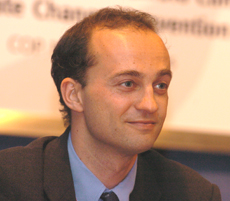 |
|
Dirk Hanschel, University of
Mannheim, discussed social scientific
research on the effectiveness of
international institutions and suggested
ways to restructure the climate
negotating process |
|
Dirk Hanschel,
University of
Mannheim, reported
on efforts to
develop a tool-kit
for international
law making that
would provide
practical guidance
to negotiators and
enhance the
effectiveness of
meetings. To make
the process more
effective, Hanschel
recommended
improving relations
between the UNFCCC
Secretariat and
subsidiary bodies,
facilitating issue
linkages, hiring
independent experts
to identify win-win
situations, and
considering
introducing a
majority voting
procedure.
Larry McFaul, UK
Verification
Research, Training
and Information
Centre, discussed
verification
mechanisms for
monitoring,
reporting, review
and compliance.
Noting that
verification
mechanisms must be
both strong and
flexible, he said
the climate regime
has a strong
compliance mechanism
in comparison to
other environmental
agreements, and
noted that national
communications and
greenhouse gas
inventories are
effective tools for
verifying policies
and results. McFaul
said uncertainty
about the second
commitment period
reduces incentives
for compliance
during the first
commitment period. |
Discussion:
Participants said
introducing majority
voting would be
difficult, and
discussed the need
for a change in the
social discourse by
focusing on the
economic benefits of
climate action and
the loss of economic
competitiveness by
countries who oppose
the Kyoto Protocol.
|
|
|
Community forest management as an
efficient,
additional carbon sequestration strategy
Presented by Environnement et
Développement du Tiers-Monde (ENDA)
|
|
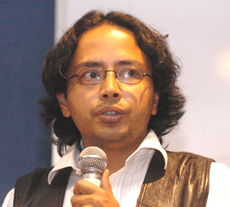 |
|
Bhaskar Karky, King Mahendra
Trust for Nature Conservation of Nepal,
emphasized that 40% of the population in
Nepal is involved in community forestry,
and said carbon revenues from avoided
deforestation projects could play a role
in reducing poverty |
|
Margaret Skutsch, University of
Twente, emphasized the role of
deforestation in global warming. She
explained that “avoided
deforestation” projects are
currently not eligible under the CDM,
but the project “Kyoto: Think
Global, Act Local” aims to provide
scientific evidence for a policy
change in the second commitment
period. She said 25 community-based
forest management projects in six
countries are involved, with local
communities trained to monitor
forest areas and make standard
biomass estimates.
Eliakimu Zahabu, Sokoine University
of Agriculture, explained the
methodology that local communities
are trained to use in order to
monitor carbon sequestration and
assess the state of the community
forest. He said the methodology aims
to reduce transaction costs, be
user-friendly and fulfill scientific
requirements.
George Jambiya, University of Dar es
Salaam/World Wildlife Fund for
Nature – Tanzania, said the Kyoto
project includes six sites in
Tanzania and one planned for Uganda.
He outlined results from a Tanzanian
village including two forests,
noting that these results indicate
good forest management. |
|
Bhaskar Karky, King Mahendra
Trust for Nature
Conservation of Nepal, said
results from the Indian
State of Uttaranhchal show
that community forests seem
to have a positive impact on
carbon storage, while
results from Nepal indicate
differences between local
communities in forest
management practices.
Libasse Ba, ENDA, said
Senegal, Mali, Burkina Faso
and Equatorial Guinea are
involved in the Kyoto
project, and presented
results from Senegal. He
said villagers in the Tamba
region have been trained to
use field methodology, and
have listed local
priorities, including fire
control, access to water,
and development of
agriculture and resources to
fight poverty.
Jeroen Verplanke,
International Institute for
Geo-Information Science and
Earth Observation (ITC),
discussed ways to capitalize
on indigenous knowledge. He
said communities involved in
the project have learnt how
to use high-tech equipment
without difficulty, and
noted that the cost of such
technology is not high and
is expected to decrease.
Peter Minang, ITC, analyzed
ways of making Cameroonian
community forestry policy
compatible with the CDM,
highlighting the need to
clarify ownership of carbon
credits and change forest
taxation and timber
extraction rules.
Mike McCall, ITC, outlined
policy developments in
community carbon forestry in
India, Nepal, Cameroon and
Mexico. He emphasized that
community forestry could be
developed to deliver
additional environmental,
economic and cultural
benefits.
|
|
Integrated administration of urban solid
waste with reduction of methane gas and
its use
Presented by the Forum of Buenos Aires (FOROBA)
|
|
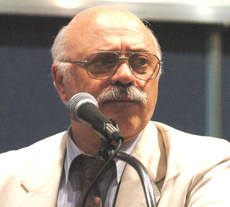 |
|
Miguel Rementería,
Interdisciplinary Commission of the
Environment, expressed regret regarding
the lack of financing for urban solid
waste management projects |
|
Miguel Rementería, Interdisciplinary
Commission of the Environment,
described plans to construct an
integrated urban solid waste
treatment plant in the municipality
of Mercedes, a province of Buenos
Aires, to manage 50 tons of urban
waste per day while capturing and
utilizing methane gas emissions. He
indicated that the municipality is
awaiting project registration under
the Clean Development Mechanism (CDM).
He stressed the need for public
awareness raising and political will
to support such an initiative, and
indicated that the project could
provide a model for other
municipalities, will have to comply
with domestic environmental
legislation, and will have a
positive social impact in providing
23 new jobs in the municipality. He
highlighted the need to ensure safe
working conditions, and explained
that the emissions savings achieved
through the construction of the
plant should be compared against
landfilling, which is the disposal
method for solid urban waste in
bordering municipalities. He
stressed the need to educate the
public to encourage them to separate
organic and inorganic wastes.
|
Alvaro Huguet, FOROBA, provided
details of the technical operation
of the plant. He described how
inorganic components that constitute
approximately 70% of the waste are
separated from organic wastes. He
explained that organic waste is
crushed and mixed, before being
introduced to an anaerobic
bio-digester in which it is broken
down to produce methane. He
indicated that the methane is
collected and used for energy
consumption in the plant and sold to
other industrial plants, while the
resulting mud is broken down in worm
beds.
Discussion: Participants questioned
how to prevent the entry of
contaminants like heavy metals into
the organic matter, and Huguet
responded that heavy metal
concentrations were negligible,
indicating that the solution was to
effectively separate organic from
inorganic waste.
|
|
|
|







